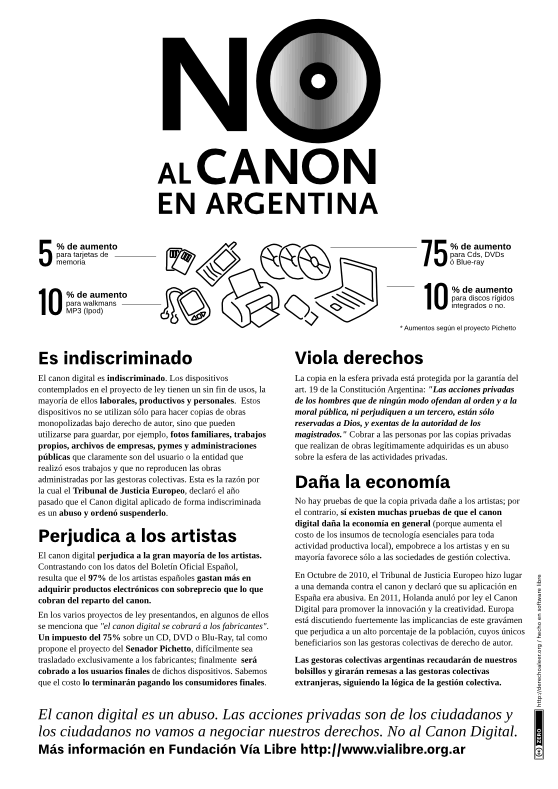
Greenpeace Canada-Financial Times.
Argentina pressed to ban crop chemical after health concerns
By Jude Webber in Buenos Aires and Hal Weitzman in,Chicago
May 29 2009
Argentina’s government is coming under pressure to ban the chemical used in the world’s best-selling herbicide, which has helped turn the country into an important world food exporter in the past decade, after new research found that it might be harmful to human health.
A group of environmental lawyers has petitioned the Supreme Court to impose a six-month ban on the sale and use of glyphosate, which is the basis for many herbicides, including the US agribusiness giant Monsanto’s Roundup product.
A ban, if approved, would mean “we couldn’t do agriculture in Argentina”, said Guillermo Cal, executive director of CASAFE, Argentina’s association of fertiliser companies.
Argentina has become a world food-exporting powerhouse, largely through the use of genetically modified seeds that have been engineered to resist glyphosate. That has allowed soya farmers to boost yields dramatically by sowing directly without clearing the land, and then spraying the herbicide to kill weeds without affecting the new crop.
The country is the world’s top exporter of soya oil and ranks second in exports of corn, third in soyabeans and seventh in wheat. Glyphosate is its most widely used herbicide and farmers spend some $450m on it a year and use 150m litres annually on their crops, Mr Cal says.
Any ban on the use of glyphosate could have dire fiscal consequences: the already cash-strapped Argentine government relies heavily on tariffs levied on agricultural exports. It is expected to rake in some $5bn this year, although that is about half the previous year’s level after a longrunning conflict with farmers, a bitter drought and lower prices have slashed production of the country’s main cash crop, soya.
“We know we’re taking on a Goliath,” said Mariano Aguilar, executive director of the Argentine Association of Environmental Lawyers, which in April filed suit before the Supreme Court seeking a nationwide ban on the sale and use of glyphosate, pending an investigation by a commission of experts set up in January by the government. No one was available to comment at the Agriculture Secretariat and the court has yet to rule.
Mr Aguilar’s action followed an investigation by Andrés Carrasco, a scientist at Conicet, a government-funded research institute. According to Mr Carrasco’s research, even tiny quantities of glyphosate could cause embryonic malformations in frogs and thus, by extrapolation, may have implications for humans.
“I suspect the toxicity classification of glyphosate is too low . . . in some cases this can be a powerful poison,” Mr Carrasco told the Financial Times in an interview. He says residents near soya-producing areas began reporting problems from 2002, a couple of years after the first big harvests using genetically modified seeds, which were approved for use in Argentina in 1996.
Research by other Argentine scientists and evidence from local campaigners has indicated a high incidence of birth defects and cancers in people living near crop-spraying areas. One study conducted by a doctor, Rodolfo Páramo, in the northern farming province of Santa Fé reported 12 malformations per 250 births, well above the normal rate.
Mr Carrasco said his research used pure glyphosate as well as herbicide containing some 500g per litre of glyphosate - about the standard concentration in many fertilisers on the market - which he then diluted 5,000 times.
Monsanto says its Roundup preparations contain between 360g and 540g per litre, and 680g to 720g per kilo in the case of solids. It notes, however, that it has only a third of the Argentine market, since glyphosate has been off-patent for several years and other producers offer generic products with varying concentrations of the chemical.
Hugh Grant, chief executive, told the FT: “I’m not too worried about the study. I think the science is shaky.”
The company maintains the chemical is safe to humans and has been used without harmful side-effects for decades.
Mr Carrasco said four people from CASAFE were sent to try to search his laboratory and he had been “seriously told off” by Lino Barrañao, Argentina’s science and technology minister. “There are very many millions of dollars at stake, but the only thing I couldn’t do was shut up when I found this out,” he said.
Mr Carrasco acknowledged there were “too many econ-omic interests at stake” to ban glyphosate outright. But, he said, officials could start ring-fencing the problem by enforcing effective controls where crops are sprayed.


























0 comentarios:
Publicar un comentario